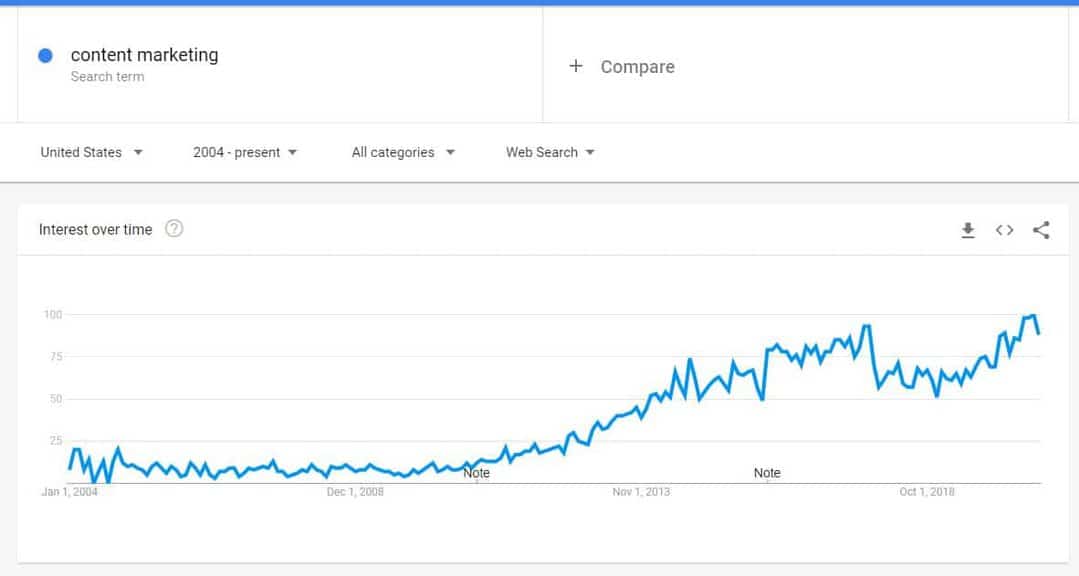It is not easy to grow a blog.
Contrary to popular belief, you can’t just write a blog post, press publish, and sit back and watch as people start coming to your site.
It just doesn’t work that way.
Instead, you must take a systematic approach that combines marketing and outreach efforts.
When combined and executed properly, bloggers can expect to receive a steady increase of traffic to their websites, which they can eventually monetize and make money with.
Let’s dive right in.
[su_note]
Editor’s Suggestion: To maximize your blogging efforts, also check out our other quick start guides:
1. Basics – What To Know Before Diving In
2. Building – How To Build & Set Up A Blog
3. Growth – How To Grow Your Blog (CURRENT PAGE)
4. Monetization – How To Make Money With Your Blog[/su_note]
Grow Your Blog With Content
Contents in this chapter:
Growing Your Blog With Content (Overview)
Research Before You Write
How To Properly Write A Blog Post
Growing Your Blog With Content (Overview)
Content marketing is one of the most powerful ways to grow your blog and take traffic to the next level.
According to Content Marketing Institute, an online resource for content marketing-related topics, content marketing is defined as…
Content marketing is a marketing technique of creating and distributing valuable, relevant and consistent content to attract and acquire a clearly defined audience – with the objective of driving profitable customer action.
While this term can be applied to the overall digital landscape of a blog as a whole, in this section we are specifically referring to growing your blog using blog posts and pages within a WordPress, or blog, domain.

At it’s simplest form, the idea of growing your blog through content can be broken down into one powerful sentence…
Growing your blog through content takes a ton of time, effort, and investment up front, but once that content ranks, it will live on for a long time.
fff
Research Before You Write
Keyword research is one of the most important ways to grow a blog’s traffic.
Instead of publishing what you think readers will want to read about, you can instead publish what you know they are searching for.
That’s the magic of keyword research.
This stuff works, believe me.
On a site that I own, I once completely overhauled the way I published content.
I produced content systematically, based on what people were searching for and then tailored those posts around the intent in which they were searching for it.
The results were astounding.
My efforts eventually led that site to grow from 3,500 visitors per month, to a whopping 1.5 million unique visitors per month.
Even I was blown away by the results.
As such, I now only create content based on what people are actually searching for, and rarely guess and hope they find it.
[su_note note_color=”#E5E5E5″]
Suggested Reading:
1. The Beginner’s Guide to Long Tail Keyword Research
[/su_note]
Match your content strategy to your target demographic
You must know your audience before trying to create content for them.
There are a lot of blogs dedicated to helping young mothers save money.
Obviously, these blogs use different pain points, syntax and article topics than blogs that focus on frugal living for college students.
While you are developing a content strategy, you need to keep the following in mind:
Understand the needs that your target demographic would like to address.
Your content should focus on these needs as closely as possible.
Make sure that you understand the terminology and writing styles that appeal to them.
For example, if you were writing blog posts about big data, you would want to use more technical and sophisticated language for data scientists than you would for laypeople that were passively interested in the topic.
Once you come up with a content strategy, you will need to follow it consistently.
Your readers will become familiar with your writing style and the types of topics that you cover, so you don’t want to disappoint them.
How To Properly Write A Blog Post
Did you know why few blogs get tons of traffic from search engines?
Social media? Email list? No. It is content.
Content is the reason why people like Rand Fishkin, Brian Clark, Neil Patel have been able to build million dollar online businesses.
Gone are the days where you could bring more search traffic by posting 500 words articles. They now won’t add any value either to your audience or Google search crawlers.
You have to create long form of content if you want to build a loyal readership and increase your search rankings.
But writing isn’t just writing. There is an entirely new level of content production that must be done, both writing and technical, to rank content that actually drives results.
[su_note note_color=”#E5E5E5″]
Suggested Reading:
1. Why And How to Write Long, In-Depth Quality Content that Ranks Highly In Google
[/su_note]
Develop a linkbuilding strategy
You will need a decent link profile to rank well in the SERPs.
Many of the linkbuilding strategies that worked well a decade ago are practically useless today.
Blog commenting, submitting your website to directory listings and link exchanges are not good ways to improve your footprint with Google.
You need to focus on building high-quality links.
Guest blogging, getting the attention of news sites and encouraging other bloggers to link to your articles are some of the best ways to build back links that will improve your rankings with Google.
5. Reach out to other bloggers and influencers
Many bloggers are preoccupied with pumping up their social media metrics.
They try to attract as many followers as they can, because they believe their follower count is closely tied to the traction they will get on social media.
While having more followers is usually a good thing, your real focus should be on getting exposure from respected experts in your niche.
Make a list of influencers that can help you increase your brand exposure.
Then come up with a strategy to engage with them, so they will help you grow your blog.
6. Monitor the growth of your blog
Successful blogs are not born overnight.
It is going to take a lot of trial and error before you turn it into a moneymaking machine.
Use an analytics tool like Google Analytics to monitor your blog over time.
Here some things to look for:
- The types of articles that get the most traction.
- Any power words in your headlines that consistently drive more clicks.
- Changes in your onsite metrics, such as your bounce rate and the average user time on your site.
- How different changes in your layout affect the number of clicks on your ads or conversions.
You will need to gradually grow your blog by making small, incremental improvements over time.
Paying attention to your analytics will help you grow it more profitably.
7. Leverage your past success
Building a successful blog is not going to be easy.
You don’t want to rest on your laurels when you finally are seeing success.
When you finally start making money off of it, you want to scale as much as you possibly can.
There are a lot of ways that you can build on your blog’s existing success.
If you are ranking well for certain types of keywords on Google, you can try expanding your keyword list and write more content around them.
If you have generated a lot of affiliate sales by building a solid reputation, you might want to consider selling your own informational products or courses.
There are always ways to increase the revenue of your blog.
Brainstorm some ideas as your blog starts to become successful.
Why Start an SEO Blog?
Organic search traffic from Google is very important to almost every website.
Entrepreneurs realize that once a website is optimized, they can earn a steady stream of quality traffic.
However, optimizing their site takes time.
Since so many people are interested in learning more about SEO, you can potentially earn a huge base of readers by building an SEO blog.
Your site can also be very lucrative.
Whether you are monetizing your site through Adsense, selling leads to SEO agencies or offering your own SEO services, people will be happy to pay.
Your site won’t gain traction if you are just rewriting content from other sources.
You are going to need to provide very detailed, evidence based content to earn quality backlinks and gain loyal readers.
Some of the best ways to do this are by:
- Conducting your own case studies
- Running SEO experiments
- Interviewing other experts in the field
You need an original strategy and put in a lot of hard work to succeed in this niche.
However, the payoff will be huge if you get traction.







